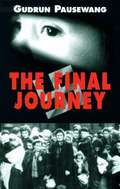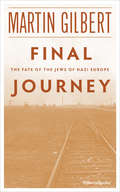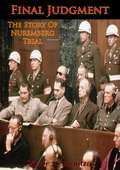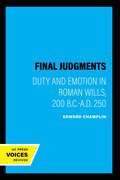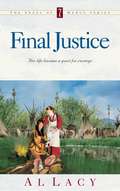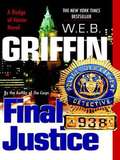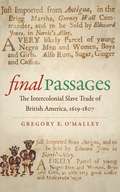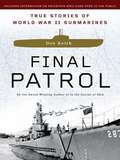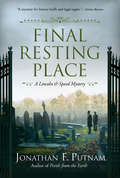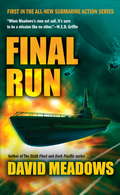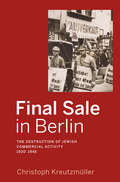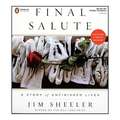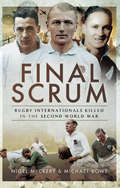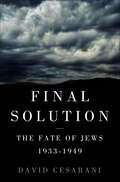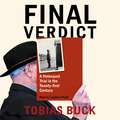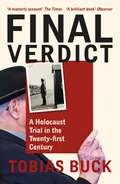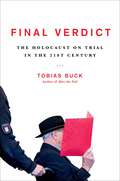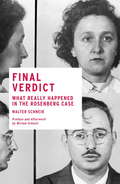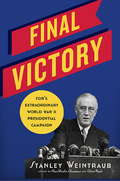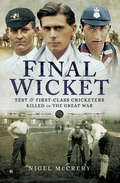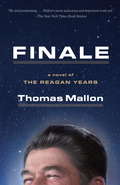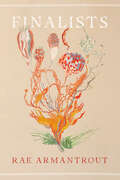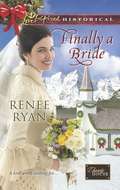- Table View
- List View
Final Journey
by Patricia Crampton Gudrun PausewangDuring World War II, eleven-year-old Alice, whose life has been sheltered and comfortable, discovers some important things about herself and the people she meets when she and her grandfather board a train and begin an increasingly intolerable journey to an unknown destination.
Final Journey: The Fate of the Jews of Nazi Europe
by Martin GilbertA thoughtful and rigorous examination of the Jewish experience under Hitler&’s &“Final Solution&”—based on eyewitness accounts and contemporary evidence. Focusing on firsthand narratives from survivors and supported by contextual scholarship, Gilbert presents a masterful cross-section of the experiences of the millions of European Jews who lost their homes, careers, families, and lives at the hands of Hitler&’s &“Final Solution.&” The accounts of these journeys are at once unique and unified by both their tragedy and by their triumphs. Gilbert&’s vast knowledge on the subject, coupled with his frank and readable style, makes Final Journey accessible to readers and scholars alike. The text is supported by eighty-four photographs—many of which were published for the first time in 1979—and twenty-four pages of maps prepared by the author, which help bring the stories of the men, women, and children back to life in unflinching detail.
Final Judgment; The Story Of Nuremberg: The Story Of Nuremberg
by Max Lerner Victor H. BernsteinUsing documents from German sources...Final Judgment: The Story of Nuremberg is a revealing X-ray of the whole political, economic, and moral system that the Nazis built up. It uses the Nuremberg trials as its starting point. But it peels away, one after another, the layers of meaning behind Nuremberg.Anyone who followed the reports of the trials in the American press must have been dismayed by their fragmentary and superficial character. All we got were bits and pieces of the Nazi story. Millions of words were, of course, cabled from Nuremberg by correspondents to the twelve corners of the world--especially in the first few days. But mainly they were color stuff, portraying the trial as a spectacle. There were pictures of the defendants and detailed accounts of their behavior in jail. There were excerpts from United States Prosecutor Robert H. Jackson's opening indictment, and some scattered debate on the international law at the basis of the trial. And at the end there was a sensational flare-up of think-pieces about how Goering managed to cheat the gallows by concealing his lethal poison. It is some kind of commentary on our press and our ways of thought that the most important trial of our era should have ended on the cheap note of a mystery thriller entitled The Case of the Hidden Poison. Nuremberg is still the Trial Nobody Knows.In contrast with this surface stuff, Victor Bernstein has written an attack-in-depth on what the Nazis did, and the techniques they used, and what Nazism did to them. The book is a scalpel-dissection of the whole Nazi disease of which the Nuremberg criminals were only the more ulcerous outcroppings.-Print ed.
Final Judgments: Duty and Emotion in Roman Wills, 200 B.C.-A.D. 250
by Edward ChamplinFreed from the familial and social obligations incumbent on the living, the Roman testator could craft his will to be a literal "last judgment" on family, friends, and society. The Romans were fascinated by the contents of wills, believing the will to be a mirror of the testator's true character and opinions. The wills offer us a unique view of the individual Roman testator's world. Just as classicists, ancient historians, and legal historians will find a mine of information here, the general reader will be fascinated by the book's lively recounting of last testaments.Who were the testators and what were their motives? Why do family, kin, servants, friends, and community all figure in the will, and how are they treated? What sort of afterlife did the Romans anticipate? By examining wills, the book sets several issues in a new light, offering new interpretations of, or new insights into, subjects as diverse as captatio (inheritance-seeking), the structure of the Roman family, the manumission of slaves, public philanthropy, the afterlife and the relation of subject to emperor.Champlin's principal argument is that a strongly felt "duty of testacy" informed and guided most Romans, a duty to reward or punish all who were important to them, a duty which led them to write their wills early in life and to revise them frequently.
Final Justice (Angel of Mercy Series #7)
by Al LacySilver Moon is in her teens when her Cheyenne village is destroyed by Colonel John Chivington's cavalry unit. As Silver Moon grows, she becomes consumed with hatred until her one goal is to kill the man responsible. But when a smallpox epidemic breaks out among the Cheyenne, Christian nurse Breanna Baylor Brockman comes to care for the sick, and the nurse's compassion for Silver Moon and her people begins the girl's journey toward conversion and healing.From the Trade Paperback edition.
Final Justice (Badge Of Honor #8)
by W.E.B. GriffinDetective Matt Payne-newly promoted to Sergeant and assigned to Homicide-finds himself in the middle of three major assignments. The first, a fatal shooting at a fast-food restaurant, seems simple, but rapidly becomes complicated. <P><P> The second begins complicated and only gets more so, as Payne becomes involved with a local guru who has fled the country, leaving behind the mummified body of his girlfriend in a trunk. And, as if that weren't enough, the self-absorbed star of a series of improbable police movies comes into town-and it is his presence that will complicate Payne's life most of all. Filled with color and detail and plots as real as the headlines, this is a riveting novel of the men and women who put their lives on the line, from the cop on the beat to the commissioner himself.
Final Passages
by Gregory E. O'MalleyThis work explores a neglected aspect of the forced migration of African laborers to the Americas. Hundreds of thousands of captive Africans continued their journeys after the Middle Passage across the Atlantic. Colonial merchants purchased and then transshipped many of these captives to other colonies for resale. Not only did this trade increase death rates and the social and cultural isolation of Africans; it also fed the expansion of British slavery and trafficking of captives to foreign empires, contributing to Britain's preeminence in the transatlantic slave trade by the mid-eighteenth century. The pursuit of profits from exploiting enslaved people as commodities facilitated exchanges across borders, loosening mercantile restrictions and expanding capitalist networks.Drawing on a database of over seven thousand intercolonial slave trading voyages compiled from port records, newspapers, and merchant accounts, O'Malley identifies and quantifies the major routes of this intercolonial slave trade. He argues that such voyages were a crucial component in the development of slavery in the Caribbean and North America and that trade in the unfree led to experimentation with free trade between empires.
Final Patrol
by Don KeithDuring World War II, the U. S. Navy's submarine service suffered the highest casualty percentage of all the American armed forces, losing one in five submariners. But despite the odds, these underwater warriors accounted for almost 60 percent of Japanese shipping losses, and were a major factor in winning the war. 16 U. S. submarines - and one German U-Boat - that saw action during WWII are now open to the public. Most have been restored and authentically equipped. Final Patrol takes a fascinating look at these subs and the personal stories of the brave sailors who lived, fought, and often died in them. Now, visitors can climb into these cramped steel cylinders, peer through their torpedo tubes, and imagine diving under the sea - perhaps for the last time - to stalk a fanatical enemy who threatened our nation's freedom.
Final Resting Place: A Lincoln and Speed Mystery (A Lincoln and Speed Mystery #3)
by Jonathan F. PutnamTwenty-nine-year-old Abraham Lincoln has spent his entire adult life running from his past—from the poverty of the dirt-floor log cabin where he was raised, from the dominion of his uneducated father, and from a failed early courtship. But now, Lincoln’s past is racing back to haunt him.It is the summer of 1838, and Springfield is embroiled in a tumultuous, violent political season. All of Springfield’s elite have gathered at a grand party to celebrate the Fourth of July. Spirits are high—until a prominent local politician is assassinated in the midst of fireworks. When his political rival is arrested, young lawyer Lincoln and his best friend Joshua Speed are back on the case to investigate. It’s no ordinary trial, however, as Lincoln and Speed soon face unwelcome complications. Lincoln’s ne’er-do-well father and stepbrother appear in town and threaten Lincoln’s good name and political future. And before long, anonymous letters start appearing in the local newspapers, with ominous threats that make Lincoln fear for himself and his loved ones. As the day of reckoning arrives, the threats against Lincoln continue to escalate. Lincoln and Speed must identify the culprit and fast, before Lincoln loses the race to outrun his past in Final Resting Place, the brilliant third installment of Jonathan F. Putnam’s acclaimed Lincoln and Speed mysteries.
Final Run
by David E. MeadowsTHE ALL-NEW SUBMARINE ACTION SERIES<P> In the Cold War, nuclear submarines lead the fight. But the USS Squallfish is one of the old school-as is her skipper, Captain Chad Shipley. While on a routine patrol, he is ordered to infiltrate the heart of the Soviet Northern Fleet to spy upon the enemy's nuclear sub capabilities.<P> But the first Soviet nuclear sub is already under way, and has found its first prey-the Squallfish.
Final Sale in Berlin: The Destruction of Jewish Commercial Activity, 1930-1945
by Christoph KreutzmüllerBefore the Nazis took power, Jewish businesspeople in Berlin thrived alongside their non-Jewish neighbors. But Nazi racism changed that, gradually destroying Jewish businesses before murdering the Jews themselves. Reconstructing the fate of more than 8,000 companies, this book offers the first comprehensive analysis of Jewish economic activity and its obliteration. Rather than just examining the steps taken by the persecutors, it also tells the stories of Jewish strategies in countering the effects of persecution. In doing so, this book exposes a fascinating paradox where Berlin, serving as the administrative heart of the Third Reich, was also the site of a dense network for Jewish self-help and assertion.
Final Salute
by Jim SheelerBased on his Pulitzer Prize-winning story, Jim Sheeler’s unprecedented look at the way our country honors its dead; Final SaluteIs a stunning tribute to the brave troops who have lost their lives in Iraq and Afghanistan and to the families who continue to mourn them They are the troops that nobody wants to see, carrying a message that no military family ever wants to hear. It begins with a knock at the door. “The curtains pull away. They come to the door. And they know. They always know,” said Major Steve Beck. Since the start of the war in Iraq, marines like Major Beck found themselves thrown into a different kind of mission: casualty notification. It is a job Major Beck never asked for and one for which he received no training. They are given no set rules, only impersonal guidelines. Marines are trained to kill, to break down doors, but casualty notification is a mission without weapons. For Beck, the mission meant learning each dead marine’s name and nickname, touching the toys they grew up with and reading the letters they wrote home. He held grieving mothers in long embraces, absorbing their muffled cries into the dark blue shoulder of his uniform. He stitched himself into the fabric of their lives, in the simple hope that his compassion might help alleviate at least the smallest piece of their pain. Sometimes he returned home to his own family unable to keep from crying in the dark. In Final Salute, Pulitzer Prize–winning journalist Jim Sheeler weaves together the stories of the fallen and of the broken homes they have left behind. It is also the story of Major Steve Beck and his unflagging efforts to help heal the wounds of those left grieving. Above all, it is a moving tribute to our troops, putting faces to the mostly anonymous names of our courageous heroes, and to the brave families who have made the ultimate sacrifice for this country. Final Saluteis the achingly beautiful, devastatingly honest story of the true toll of war. After the knock on the door, the story has only begun.
Final Scrum: Rugby Internationals Killed in the Second World War
by Nigel McCreryAfter the terrible losses of The Great War, twenty years later the Second World War resulted in the death of some of the finest sporting icons. This book honors the ninety International Rugby players who lost their lives. Fifteen were Scottish, fourteen English, eleven Welsh and eight Irish. Australia and New Zealand suffered with ten and two Internationals killed respectively and France eight. Germany topped the list with nineteen. In the same way that the Authors best-selling Into Touch remembered the 130 Internationals lost in the First World War, Final Scrum gives an individual biography of each of the ninety with their international and club playing record as well as their backgrounds, details of their military careers and circumstances of their death. We learn where they are buried or commemorated together with at least one photograph of each player.Rugby enthusiasts will find this book a fascinating and moving record of the sacrifice of the finest young men of their generation who fought in the second worldwide conflict of the 20th Century.
Final Solution: The Fate of Jews, 1933–1949
by David CesaraniDavid Cesarani’s Final Solution is a magisterial work of history that chronicles the fate of Europe’s Jews. Based on decades of scholarship, documentation newly available from the opening of Soviet archives, declassification of Western intelligence service records, as well as diaries and reports written in the camps, Cesarani provides a sweeping reappraisal that challenges accepted explanations for the anti-Jewish politics of Nazi Germany and the inevitability of the “final solution.” The persecution of the Jews, as Cesarani sees it, was not always the Nazis’ central preoccupation, nor was it inevitable. He shows how, in German-occupied countries, it unfolded erratically, often due to local initiatives. For Cesarani, war was critical to the Jewish fate. Military failure denied the Germans opportunities to expel Jews into a distant territory and created a crisis of resources that led to the starvation of the ghettos and intensified anti-Jewish measures. Looking at the historical record, he disputes the iconic role of railways and deportation trains. From prisoner diaries, he exposes the extent of sexual violence and abuse of Jewish women and follows the journey of some Jewish prisoners to displaced persons camps. David Cesarani’s Final Solution is the new standard chronicle of the fate of a heroic people caught in the hell that was Hitler’s Germany.
Final Verdict: A Holocaust Trial in the Twenty-first Century
by Tobias Buck'[A] gripping and fascinating book' JAMES HOLLAND, DAILY TELEGRAPH, 5* review'A thrilling read ' PHILIPPE SANDS, author of EAST WEST STREET***On 17 October 2019, in Hamburg's imposing criminal justice building, a trial laden with extraordinary historical weight begins to unfold. Bruno Dey stands accused of being involved in a crime committed over seven decades ago: the murder of at least 5,230 inmates at Stutthof, the Nazi concentration camp in present-day Poland. Only seventeen at the time, Dey was a member of the SS unit responsible for administering the camp. Though he concedes to his role as a guard, he adamantly denies responsibility for the killings. Dey's trial comes at a poignant moment. As the last members of the war generation - both victims and perpetrators - disappear, so does their first-hand knowledge of the Holocaust's horrors. Beyond its immediate legal implications, the trial stirs profound questions that resonate not only within the realms of German history, politics and collective memory but also within the author's own family. Tobias Buck revisits the silence that surrounds his family's experience during the Nazi period - and his German grandfather's role and responsibility. Through the lens of this riveting courtroom drama, Final Verdict explores the trial's broader significance, both on a political and personal level, and invites us to grapple with the question of whether it is right to prosecute Bruno Dey more than seven decades after he stood guard at Stutthof, and, perhaps more importantly, what we might have done in his place.
Final Verdict: A Holocaust Trial in the Twenty-first Century
by Tobias Buck'[A] gripping and fascinating book' JAMES HOLLAND, DAILY TELEGRAPH, 5* review'A brilliant book . . . timely . . . gripping' RACHEL COOKE, OBSERVER'A thrilling read ' PHILIPPE SANDS, author of EAST WEST STREET***On 17 October 2019, in Hamburg's imposing criminal justice building, a trial laden with extraordinary historical weight begins to unfold. Bruno Dey stands accused of being involved in a crime committed over seven decades ago: the murder of at least 5,230 inmates at Stutthof, the Nazi concentration camp in present-day Poland. Only seventeen at the time, Dey was a member of the SS unit responsible for administering the camp. Though he concedes to his role as a guard, he adamantly denies responsibility for the killings. Dey's trial comes at a poignant moment. As the last members of the war generation - both victims and perpetrators - disappear, so does their first-hand knowledge of the Holocaust's horrors. Beyond its immediate legal implications, the trial stirs profound questions that resonate not only within the realms of German history, politics and collective memory but also within the author's own family. Tobias Buck revisits the silence that surrounds his family's experience during the Nazi period - and his German grandfather's role and responsibility. Through the lens of this riveting courtroom drama, Final Verdict explores the trial's broader significance, both on a political and personal level, and invites us to grapple with the question of whether it is right to prosecute Bruno Dey more than seven decades after he stood guard at Stutthof, and, perhaps more importantly, what we might have done in his place.
Final Verdict: The Holocaust on Trial in the 21st Century
by Tobias BuckThe gripping narrative of one of the last Nazi criminal trials in Germany—that of Bruno Dey, a 93-year-old former concentration camp guard charged with aiding the murder of more than 5,000 people—and a larger exploration of Germany's reckoning with the Holocaust, from silence to memory to today's rising tide of fascism and antisemitism. Bruno Dey's trial formed part of an extraordinary series of Holocaust cases brought by German prosecutors in recent years in a belated attempt to deliver justice to the victims and reverse decades of judicial neglect. It also surfaced at a pivotal moment for Germany and its thinking about the Holocaust. The Nazi genocide continues to occupy a crucial space in German public life, but many of the country's long-held certainties and convictions around the Holocaust are starting to fray. This reflects in part the passage of time, and the fact that the last surviving witnesses—victims and perpetrators alike—are rapidly fading away. But it&’s also the result of profound changes in German politics and society. The far-right has made electoral gains and is openly challenging the country&’s historic commitment to Holocaust remembrance. At the same time, there is a small but vociferous group of intellectuals on the left who question Germany&’s memory culture from a different angle, asking what political lessons the country should draw from the Holocaust today. What does it mean for the country&’s new Muslim citizens from Syria and Afghanistan, many of whom arrived with their own traumas, to be expected to assume the nation&’s guilt? Final Verdict investigates questions that touch on German history, politics, and memory culture, and on the author&’s own family history. Buck revisits the silence that surrounds his own family&’s experiences and conduct during the Nazi period. In the face of rising anti-Semitism in Germany, the United States, and globally, Final Verdict examines the case for Holocaust justice in the twenty-first century—and the lessons that Germany's struggle with its Nazi past holds for the world today.
Final Verdict: What Really Happened in the Rosenberg Case
by Walter SchneirA new narrative of the famed case that finally solves its remaining mysteries, by the author of the bestselling Invitation to an Inquest. Walter and Miriam Schneir's 1965 bestseller Invitation to an Inquest was among the first critical accounts of the controversial case of Julius and Ethel Rosenberg, famously executed in 1953 for passing atom bomb secrets to Soviet Russia. In Invitation the Schneirs presented exhaustive and damning evidence that key witnesses in the trial had changed their stories after coaching from prosecutors, and that the FBI had forged evidence. The conclusion was unavoidable: The Rosenbergs were innocent. But were they? Thirty years after the publication of Inquest, Walter Schneir was back on the case after bits and pieces of new evidence started coming to light, much of it connecting Julius Rosenberg to Soviet espionage. Over more than a decade, Schneir continued his search for the truth, meeting with former intelligence officials in Moscow and Prague, and cross checking details recorded in thousands of government documents. The result is an entirely new narrative of the Rosenberg case. The reality, Schneir demonstrates, is that Rosenbergs ended up hopelessly trapped: prosecuted for atomic espionage they didn't commit--but unable to admit earlier espionage activities during World War II. As it happened, Julius Rosenberg was only marginally involved in the atomic spy ring he was depicted as leading--while Ethel, critically, was not at all involved. The two lied when the contended they knew nothing about espionage. Ethel knew about it and Julius had practiced it, but the government's contention that they had stolen the "secret" of the atom bomb was critically and fatally flawed.
Final Victory: FDR's Extraordinary World War II Presidential Campaign
by Stanley WeintraubWhen the wartime 1944 presidential election campaign geared up late that spring, Franklin D. Roosevelt had already occupied the White House years longer than any other president. Sensing likely weakness, the Republicans mounted an energetic and expensive campaign, hitting hard at FDR’s liberal domestic policies and the war’s ongoing cost. Despite gravely deteriorating health, FDR and his feisty running mate, the unexpected Harry Truman, campaigned vigorously against young governor Thomas E. Dewey of New York and old-line Ohio governor John Bricker. Roosevelt’s charm and wit, as well as the military successes in Europe and the Pacific, contributed to his sweeping electoral victory. But the hard-fought campaign would soon take its toll on America’s only four-term president. Preeminent historian and biographer Stanley Weintraub recaptures FDR’s striking "last campaign” and the year’s momentous events, from the rainy city streets where Roosevelt, his legs paralyzed by polio since 1922, rode in an open car, to the battlefronts where the commander-in-chief’s forces were closing in on Hitler and Hirohito. The tale is unforgettable.
Final Wicket: Test and First Class Cricketers Killed in the Great War
by Nigel McCreryWhile cricket remains a national game today, at the beginning of the Twentieth Century, it was THE national game. Cricketers were the sporting icons of their age, as footballers are today.When the call to arms was made in 1914 and the years of war that followed, it was answered in droves by young men including Test and First Class cricketers. The machine guns and gas of the Western Front and other theatres did not discriminate and many hundreds of these star performers perished alongside their lesser known comrades. The author has researched the lives and deaths of over 200 top class cricketers who made the ultimate sacrifice. He includes not just British players but those from the Empire. The enormity of the horror and wholesale loss of life during The Great War is well demonstrated by these moving biographies.
Finale
by Thomas MallonAdding to a fiction chronicle that has already spanned American history from the Lincoln assassination to the Watergate scandal, Thomas Mallon now brings to life the tumultuous administration of the most consequential and enigmatic president in modern times. Finale captures the crusading ideologies, blunders, and glamour of the still-hotly-debated Reagan years, taking readers to the political gridiron of Washington, the wealthiest enclaves of Southern California, and the volcanic landscape of Iceland, where the president engages in two almost apocalyptic days of negotiation with Mikhail Gorbachev. Along with Soviet dissidents, illegal-arms traders, and antinuclear activists, the novel's memorable characters include Margaret Thatcher, Jimmy Carter, Pamela Harriman, John W. Hinckley, Jr. (Reagan's would-be assassin), and even Bette Davis, with whom the president had long ago appeared onscreen. Several figures--including a humbled, crafty Richard Nixon; the young, brilliantly acerbic Christopher Hitchens; and an anxious, astrology-dependent Nancy Reagan (on the verge of a terrible realization)--become the eyes through which readers see the last convulsions of the Cold War, the beginning of the AIDS epidemic, and a political revolution. At the center of it all--but forever out of reach--is Ronald Reagan himself, whose genial remoteness confounds his subordinates, his children, and the citizens who elected him. Finale is the book that Thomas Mallon's work has been building toward for years. It is the most entertaining and panoramic novel about American politics since Advise and Consent, more than a half century ago.From the Hardcover edition.
Finale: A Novel of the Reagan Years
by Thomas MallonA New York Times Notable Book One of the Best Books of the Year: The Washington Post, San Francisco Chronicle, The Daily Beast, The Miami Herald, St. Louis Post-DispatchAdding to a fiction chronicle that has already spanned American history from the Lincoln assassination to the Watergate scandal, Thomas Mallon now brings to life the tumultuous administration of the most consequential and enigmatic president in modern times. Finale captures the crusading ideologies, blunders, and glamour of the still-hotly-debated Reagan years, taking readers to the political gridiron of Washington, the wealthiest enclaves of Southern California, and the volcanic landscape of Iceland, where the president engages in two almost apocalyptic days of negotiation with Mikhail Gorbachev. Along with Soviet dissidents, illegal-arms traders, and antinuclear activists, the novel's memorable characters include Margaret Thatcher, Jimmy Carter, Pamela Harriman, John W. Hinckley, Jr. (Reagan's would-be assassin), and even Bette Davis, with whom the president had long ago appeared onscreen. Several figures--including a humbled, crafty Richard Nixon; the young, brilliantly acerbic Christopher Hitchens; and an anxious, astrology-dependent Nancy Reagan (on the verge of a terrible realization)--become the eyes through which readers see the last convulsions of the Cold War, the beginning of the AIDS epidemic, and a political revolution. At the center of it all--but forever out of reach--is Ronald Reagan himself, whose genial remoteness confounds his subordinates, his children, and the citizens who elected him. Finale is the book that Thomas Mallon's work has been building toward for years. It is the most entertaining and panoramic novel about American politics since Advise and Consent, more than a half century ago.From the Hardcover edition.
Finalists (Wesleyan Poetry Ser.)
by Rae ArmantroutA double book by Pulitzer Prize winning poet Rae Armantrout What will we call the last generation before the looming end times? With Finalists Rae Armantrout suggests one option. Brilliant and irascible, playful and intense, Armantrout nails the current moment's debris fields and super computers, its sizzling malaise and confusion, with an exemplary immensity of heart and a boundless capacity for humor. The poems in this book find (and create) beauty in midst of the ongoing crisis. CONTRAST What's to like if not contrast? Shadows beneath the model's sharp cheekbones, her ample yet precise lips. Clean lines separating bounty from its opposite. This is not what I want to want. These eyes on the hypothetical distance.
Finally a Bride
by Renee RyanReclaiming the Runaway Bride Seven years and two broken engagements haven't erased Garrett Mitchell from Molly Scott's mind. Her employer insists Molly and Garrett belong together. To appease the well-meaning matchmaker, the pair agrees to a pretend courtship. But too late, Molly finds herself falling for a man who might never trust her. Garrett is a prominent Denver attorney now, not the naive seventeen-year-old who always felt second-best. Surely the string of suitors Molly's left behind only proves her fickleness. Does Garrett dare believe that she has only ever been waiting for him? The third engagement could be the charm, for his first-and only-love. Charity House: Offering an oasis of hope, faith and love on the rugged Colorado frontier
Finance & Development
by Jeremy Clift Marina Primorac Hyun-Sung KhangThis publication gathers together articles, that have appeared in Finance & Development over the past eight years, which dealt with the inplications of, and responses to, globalization. The focus is on financial globalization, including the policy implications of the huge growth in cross-border capital flows.
